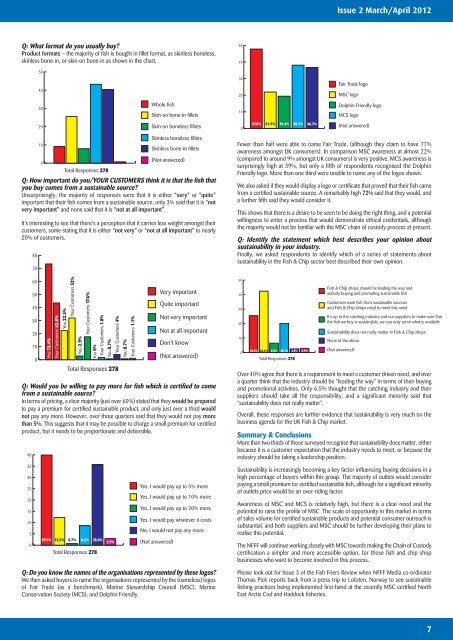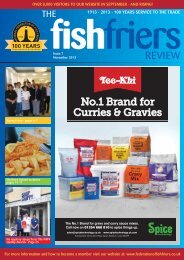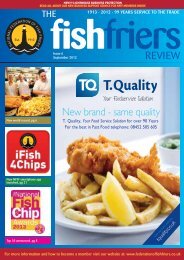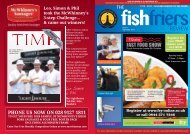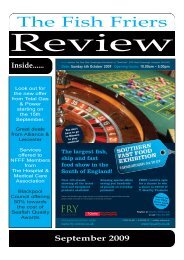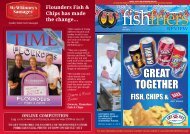Fish friers Review - Mar / Apr 2012 - Issue 2 - National Federation of ...
Fish friers Review - Mar / Apr 2012 - Issue 2 - National Federation of ...
Fish friers Review - Mar / Apr 2012 - Issue 2 - National Federation of ...
Create successful ePaper yourself
Turn your PDF publications into a flip-book with our unique Google optimized e-Paper software.
Q: What format do you usually buy?<br />
Product formats – the majority <strong>of</strong> fish is bought in fillet format, as skinless boneless,<br />
skinless bone-in, or skin-on bone-in as shown in the chart.<br />
Total Responses 278<br />
Q: How important do you/YOUR CUSTOMERS think it is that the fish that<br />
you buy comes from a sustainable source?<br />
Unsurprisingly, the majority <strong>of</strong> responses were that it is either “very” or “quite”<br />
important that their fish comes from a sustainable source, only 3% said that it is “not<br />
very important” and none said that it is “not at all important”.<br />
It’s interesting to see that there’s a perception that it carries less weight amongst their<br />
customers, some stating that it is either “not very” or “not at all important” to nearly<br />
20% <strong>of</strong> customers.<br />
Q: Would you be willing to pay more for fish which is certified to come<br />
from a sustainable source?<br />
In terms <strong>of</strong> pricing, a clear majority (just over 60%) stated that they would be prepared<br />
to pay a premium for certified sustainable product, and only just over a third would<br />
not pay any more. However, over three quarters said that they would not pay more<br />
than 5%. This suggests that it may be possible to charge a small premium for certified<br />
product, but it needs to be proportionate and defensible.<br />
40<br />
35<br />
30<br />
25<br />
20<br />
15<br />
10<br />
5<br />
0<br />
80<br />
70<br />
60<br />
50<br />
40<br />
30<br />
20<br />
10<br />
0<br />
50<br />
40<br />
30<br />
20<br />
10<br />
0<br />
You 73.4%<br />
Your Customers 43.5%<br />
You 22.3%<br />
Your Customers 32%<br />
You 2.9%<br />
Your Customers 17.6%<br />
You 0%<br />
Your Customers 1.8%<br />
You 0.7%<br />
Total Responses 278<br />
39.9% 12.2% 0.7% 8.6% 35.6% 2.9%<br />
Total Responses 278<br />
Your Customers 4%<br />
You 0.7%<br />
Your Customers 1.1%<br />
Whole fish<br />
Skin-on bone-in fillets<br />
Skin-on boneless fillets<br />
Skinless boneless fillets<br />
Skinless bone-in fillets<br />
(Not answered)<br />
Very important<br />
Quite important<br />
Not very important<br />
Not at all important<br />
Don’t know<br />
(Not answered)<br />
Yes, I would pay up to 5% more<br />
Yes, I would pay up to 10% more<br />
Yes, I would pay up to 20% more<br />
Yes, I would pay whatever it costs<br />
No, I would not pay any more<br />
(Not answered)<br />
Q: Do you know the names <strong>of</strong> the organisations represented by these logos?<br />
We then asked buyers to name the organisations represented by the (nameless) logos<br />
<strong>of</strong> Fair Trade (as a benchmark), <strong>Mar</strong>ine Stewardship Council (MSC), <strong>Mar</strong>ine<br />
Conservation Society (MCS), and Dolphin Friendly.<br />
50<br />
40<br />
30<br />
20<br />
10<br />
0<br />
<strong>Issue</strong> 2 <strong>Mar</strong>ch/<strong>Apr</strong>il <strong>2012</strong><br />
Fewer than half were able to name Fair Trade, (although they claim to have 77%<br />
awareness amongst UK consumers). In comparison MSC awareness at almost 22%<br />
(compared to around 9% amongst UK consumers) is very positive. MCS awareness is<br />
surprisingly high at 39%, but only a fifth <strong>of</strong> respondents recognised the Dolphin<br />
Friendly logo. More than one third were unable to name any <strong>of</strong> the logos shown.<br />
We also asked if they would display a logo or certificate that proved that their fish came<br />
from a certified sustainable source. A remarkably high 72% said that they would, and<br />
a further fifth said they would consider it.<br />
This shows that there is a desire to be seen to be doing the right thing, and a potential<br />
willingness to enter a process that would demonstrate ethical credentials, although<br />
the majority would not be familiar with the MSC chain <strong>of</strong> custody process at present.<br />
Q: Identify the statement which best describes your opinion about<br />
sustainability in your industry.<br />
Finally, we asked respondents to identify which <strong>of</strong> a series <strong>of</strong> statements about<br />
sustainability in the <strong>Fish</strong> & Chip sector best described their own opinion.<br />
50<br />
40<br />
30<br />
20<br />
10<br />
0<br />
47.8% 21.9% 19.4% 38.1% 36.7%<br />
25.5% 42.4% 6.5% 20.1% 2.5% 2.9%<br />
Total Responses 278<br />
Fair Trade logo<br />
MSC logo<br />
Dolphin Friendly logo<br />
MCS logo<br />
(Not answered)<br />
<strong>Fish</strong> & Chip shops should be leading the way and<br />
actively buying and promoting sustainable fish<br />
Customers want fish from sustainable sources<br />
and <strong>Fish</strong> & Chip shops need to meet this need<br />
It’s up to the catching industry and our suppliers to make sure that<br />
the fish we buy is sustainable, we can only serve what is available<br />
Sustainability does not really matter in <strong>Fish</strong> & Chip shops<br />
None <strong>of</strong> the above<br />
(Not answered)<br />
Over 40% agree that there is a requirement to meet a customer driven need, and over<br />
a quarter think that the industry should be “leading the way” in terms <strong>of</strong> their buying<br />
and promotional activities. Only 6.5% thought that the catching industry and their<br />
suppliers should take all the responsibility, and a significant minority said that<br />
“sustainability does not really matter”.<br />
Overall, these responses are further evidence that sustainability is very much on the<br />
business agenda for the UK <strong>Fish</strong> & Chip market.<br />
Summary & Conclusions<br />
More than two thirds <strong>of</strong> those surveyed recognise that sustainability does matter, either<br />
because it is a customer expectation that the industry needs to meet, or because the<br />
industry should be taking a leadership position.<br />
Sustainability is increasingly becoming a key factor influencing buying decisions in a<br />
high percentage <strong>of</strong> buyers within this group. The majority <strong>of</strong> outlets would consider<br />
paying a small premium for certified sustainable fish, although for a significant minority<br />
<strong>of</strong> outlets price would be an over-riding factor.<br />
Awareness <strong>of</strong> MSC and MCS is relatively high, but there is a clear need and the<br />
potential to raise the pr<strong>of</strong>ile <strong>of</strong> MSC. The scale <strong>of</strong> opportunity in this market in terms<br />
<strong>of</strong> sales volume for certified sustainable products and potential consumer outreach is<br />
substantial, and both suppliers and MSC should be further developing their plans to<br />
realise this potential.<br />
The NFFF will continue working closely with MSC towards making the Chain <strong>of</strong> Custody<br />
certification a simpler and more accessible option, for those fish and chip shop<br />
businesses who want to become involved in this process.<br />
Please look out for <strong>Issue</strong> 3 <strong>of</strong> the <strong>Fish</strong> Friers <strong>Review</strong> when NFFF Media co-ordinator<br />
Thomas Pick reports back from a press trip to L<strong>of</strong>oten, Norway to see sustainable<br />
fishing practices being implemented first-hand at the recently MSC certified North<br />
East Arctic Cod and Haddock fisheries.<br />
7


